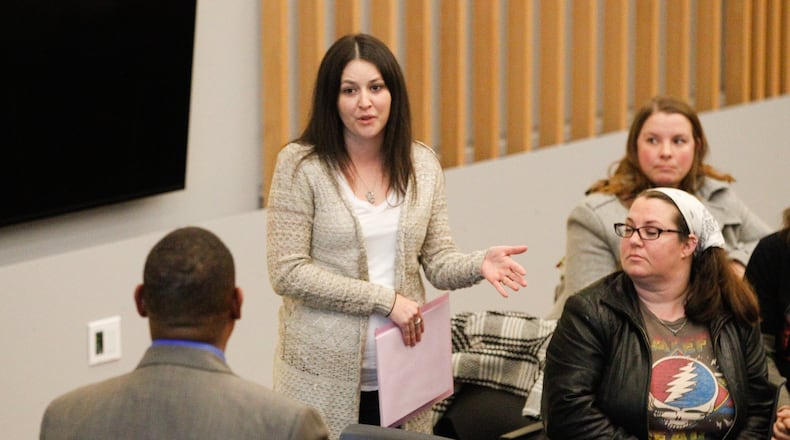“But no one ever answers me back,” Brown said.
On Tuesday night, Brown and about 120 others at the downtown Dayton Metro Library were told by officials that the county intends to engage with them to turn a corner with the animal shelter.
“We’re just happy that we are finally getting this going,” Brown said. “We just need some kind of new direction.”
MORE: Critics worried their voices won’t be heard during sweeping review of county animal shelter
Montgomery County Administrator Michael Colbert said the county would be “totally transparent” and make the final report by Team Shelter USA and future shelter metrics readily available online.
“We hear your concerns, and we are making the necessary corrections,” he said.
Dr. Sara Pizano, the strategist hired to assess operations at the ARC – which many animal welfare advocates claim is mismanaged — said the shelter’s live release will show dramatic improvement next year.
“2019 is going to be a transformative year at your shelter, and it’s going to be unrecognizable in a good way, in the best way,” Pizano said.
Pizano, creator of Team Shelter USA, said she will provide the county with a host of recommendations – many budget neutral — to lower intake and reduce the number of animals euthanized.
MORE: Critics target Montgomery Co. Animal Resource Center for animal deaths
Shelter critics say the facility has been slow to adopt modern practices that would substantially reduce the number of companion animals that get put to death.
The benchmark is saving more than 90 percent of animals, a standard achieved at other shelters Pizano has worked with, she said. Last year, the ARC rate was much lower: 56.7 percent. The number improved this year, topping 75 percent in July, but dipped below 63 percent last month.
Pizano outlined ways to reduce the number of animals in shelter from an improved spay and neuter program to buttressing adoption and fostering opportunities as well as working closer with animal rescue organizations and those who can’t afford a pet’s medical care.
Rick Fader of Kettering said he liked what he heard during the meeting but said the community conversation wouldn’t be this far along if many animal rights groups hadn’t kept the county’s “feet to the fire.”
“I’ve seen nothing here but great information. I don’t see any drawbacks from it at all,” Fader said. “I would like to impress upon the county commission this is what we want to see done. We want to see change.”
The assessment team, which began work Monday morning interviewing ARC staff, also includes Dr. Becca Boronat of the Charleston (S.C.) Animal Society, Cameron Moore from the University of Florida, and Dr. Kim Sanders, director of Anderson County (S.C.) PAWS. They will conclude site work Friday and will provide a written report with recommendations within a couple of weeks.
Colbert said the county is committed to Pizano’s review – the most extensive the shelter has undergone in 15 years.
Some steps already have been taken, including canceling cat contracts with municipalities and the approval to hire a full-time outreach specialist to augment existing adoption and recruitment efforts. The county will create a timeline for implementing further recommendations, he said.
“We believe that in the first quarter to the second quarter of 2019, almost all of the steps that Dr. Pizano will recommend will be implemented,” Colbert said.
Centerville resident Jenet Mullins, who helps place dogs through Puppy Pals Rescue, said the meeting was positive but many questions remain unanswered, including how to pay for recommendations that don’t come cheap.
“I was pleased — because I’ve been in rescue long enough to see several sides of it — that our county really is aware there are problems at ARC and they are committed to making it better,” Mullins said.
About the Author

